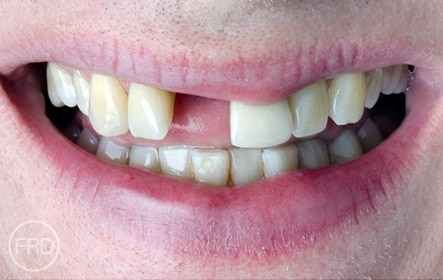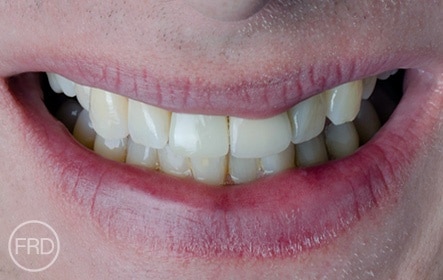Enquire about Dental Implants

What are dental implants?
Dental implants are artificial tooth roots used to replace missing teeth. They are most commonly made of titanium, which is known for its durability and compatibility with the human body. The titanium integrates with the jawbone to provide a stable foundation for artificial teeth. The implant itself is a small post that acts as the base to support crowns, bridges, or dentures. Dental implants are also a long-lasting solution, offering a more natural and permanent alternative to traditional dentures or bridges.
When dental implants might be recommended
Depending on an individual’s needs, dental implants might be recommended in various situations. Below are some common scenarios where dental implants can be a suitable option for restoring a healthy, confident smile.
Missing teeth
Dental implants are often recommended when a person has one or more missing teeth, providing a permanent solution to restore function and aesthetics.
Difficulty with dentures
Implants can be an option for those who struggle with ill-fitting dentures, offering better stability and comfort.
Bone loss
When there is bone loss in the jaw, implants can help minimise further deterioration. They also provide a strong foundation for replacement teeth.


The benefits of dental implants
Dental implants provide a reliable and long-lasting solution for missing teeth, offering several advantages over traditional options.
Improved appearance
Dental implants provide a natural-looking solution to missing teeth. Since they are custom-designed to match your natural teeth, they help restore a more youthful and complete smile.
Enhanced comfort
Unlike dentures, dental implants integrate with your jawbone, becoming a stable and long-term part of your mouth. This eliminates the discomfort that can come with removable appliances. This stability offers greater comfort during daily activities like speaking and eating.
Better functionality
Implants function like natural teeth, allowing you to eat, speak, and chew with confidence. They provide the strength needed to enjoy a wider range of foods, unlike traditional dentures or bridges.
Durability
With proper care, dental implants can last for many years, often a lifetime. They are resistant to decay and can withstand normal wear and tear, making them a long-term investment.
Bone preservation
Dental implants help preserve the jawbone by stimulating it, preventing the bone loss that often occurs when teeth are missing. This can help maintain facial structure and prevent further complications.
The dental implant process
The dental implant process typically takes several months depending on complexity and begins with a comprehensive assessment. During this stage, the dentist takes X-rays and impressions to assess the health of the jawbone and determine the best treatment approach.
Once planning is complete, the next step is the surgical placement of the implant, which involves inserting a titanium post into the jawbone to act as the new tooth root. After placement, the implant needs time to fuse with the bone in a process known as osseointegration, which can take a few months.
Once osseointegration is complete, the dentist attaches an abutment to the implant, which acts as a connector for the artificial tooth. Finally, a custom-made crown or prosthetic tooth is placed on the abutment, designed to match the shape and colour of your natural teeth.
The entire process, while involving multiple steps, ultimately results in a durable, functional, and natural-looking tooth replacement.
Why get your implants in the UK
Getting dental implants in the UK offers several advantages over seeking treatment abroad, such as in Turkey.
One of the main benefits is the high standards of care and safety provided by UK dental practices. These are regulated by strict guidelines to ensure quality so, when you choose a UK dentist, you can be confident in their training, expertise, and the use of advanced technology to deliver successful results.
Another key advantage is the ease of access to follow-up appointments and aftercare. If there are any complications or concerns with your implants, it’s much simpler to address them when you’re based in the same country. You also have the peace of mind that comes with being close to your dental team for ongoing support.
While treatments abroad may seem more affordable initially, hidden costs, travel expenses, and the potential for complications can make UK treatment a safer, more reliable option in the long run.
Dental implants at Fulham Road Dental
At Fulham Road Dental, we offer high-quality dental implants to restore your smile and confidence. Our experienced team of dental professionals uses the latest technology and techniques to ensure a safe, effective, and comfortable procedure.
We provide personalised consultations to assess your needs and create a tailored treatment plan that suits you. No matter how many teeth you are replacing, our implants blend in with your existing teeth, offering both aesthetic and functional benefits.
With our commitment to patient care and long-term results, Fulham Road Dental is ready to help you replace your missing teeth and enhance your smile. You can be sure that we will guide you through every step of the process with expert care and attention.

Dental Implant FAQs
How long does the dental implant process take?
As the process involves multiple stages, it can take several months from start to finish.
First, a consultation and evaluation are conducted, including X-rays to assess bone health. The actual implant surgery usually takes 1–2 hours per implant. After the titanium post is placed into the jawbone, a healing period of 3 to 6 months is usually required for the bone to fuse with the implant in a process called osseointegration. Once this is complete, an abutment is placed, followed by the attachment of a custom-made crown or artificial tooth.
Overall, the process can take between 4 and 9 months, depending on individual healing and whether additional procedures, like bone grafting, are required. Your dentist will provide a more specific timeline based on your individual needs.
Are dental implants painful?
The dental implant procedure is typically not painful, as it is performed under local anaesthesia, which numbs the area where the implant is placed. Most patients report experiencing minimal discomfort during the procedure itself. After the anaesthesia wears off, it is normal to experience some mild discomfort, swelling, or bruising in the treated area. This can usually be managed with over-the-counter pain relief and should subside within a few days.
In some cases, stronger pain medication may be prescribed for more significant discomfort. While the healing process may take time, most people find that the discomfort is minimal and temporary. Your dentist will provide aftercare instructions to help manage any discomfort during recovery.
How long do dental implants last?
Dental implants are a durable, long-term solution for missing teeth. With proper placement, they can last between 15 to 25 years, and in some cases, even longer. The titanium post, which fuses with the jawbone, is highly resistant to damage and decay. However, the crown or artificial tooth attached to the implant may need to be replaced after 10 to 15 years due to natural wear.
While the titanium implant itself can last for decades, the lifespan of the overall restoration depends on factors such as the material used for the crown and daily use. Dental implants are a reliable and lasting investment for improving both appearance and function.
How do I know if I’m a good candidate for dental implants?
If you want to be approved for dental implants, you should be healthy overall and have sufficient bone density in the jaw to support the implant. At your consultation, the dentist will examine your oral health, including the condition of your gums and teeth. They will also take X-rays to evaluate your bone structure. If you have significant bone loss, your dentist may recommend a bone graft to support implant placement.
Additionally, individuals who do not smoke and do not have underlying health conditions such as uncontrolled diabetes are often better candidates. Your dentist will guide you through the evaluation process to determine if dental implants are the right solution for your needs.
What materials are dental implants made from?
Dental implants are primarily made from titanium, a biocompatible material that is highly durable and integrates well with the jawbone. Titanium is resistant to corrosion, making it an excellent material for dental implants.
In some cases, zirconia, a strong ceramic material, may be used as an alternative for those who prefer a metal-free option. Zirconia implants offer a similar level of strength and durability as titanium and can be more aesthetically pleasing due to their tooth-like colour. Both titanium and zirconia are designed to provide a secure, long-lasting solution for replacing missing teeth.
Are there any risks associated with dental implants?
While dental implants are generally safe and effective, like any surgical procedure, there are some risks involved. Potential risks include infection at the implant site, damage to surrounding teeth or nerves, and implant failure due to improper integration with the jawbone. In rare cases, the implant may become loose or fail to fuse with the bone, requiring removal and replacement.
Other risks can include gum recession or sinus issues if the implant is placed in the upper jaw. However, these complications are uncommon and can often be avoided with proper planning and care. Choosing an experienced dentist and following aftercare instructions can significantly reduce these risks, ensuring a successful implant procedure and long-term results.
Can I get an implant for just one missing tooth?
Yes, dental implants are an excellent solution for replacing a single missing tooth. Whereas bridges rely on the surrounding teeth for support, an implant replaces only the missing tooth without affecting healthy teeth. This ensures the surrounding teeth remain intact and unaffected. Implants also offer superior durability and stability, allowing you to eat, speak, and smile with confidence.
Additionally, dental implants mimic the appearance and function of natural teeth, providing a seamless, long-lasting solution. There is no risk of shifting or discomfort, unlike some dentures or bridges, implants remain securely in place, reducing the risk of shifting or discomfort.
How do I care for my dental implants?
Caring for your dental implants is easy and similar to caring for natural teeth. Brush your implant and gums gently with a soft toothbrush and non-abrasive toothpaste. Make sure to floss every day to remove plaque and food from around the implant. Regular visits to your dentist for check-ups and cleanings are important to keep your implant healthy.
Avoid biting into very hard foods or using your teeth as tools, as this may damage the implant. If you notice any pain, swelling, or problems with your implant, contact your dentist right away. With good care, your dental implant can last many years and continue to look and function like a natural tooth.
Can I eat normally with dental implants?
Yes, you can eat normally with dental implants once the healing process is complete. Implants are designed to function just like natural teeth, so you can enjoy a wide variety of foods without worry. Initially, after the implant is placed, you may need to stick to softer foods for a few weeks to allow your gums to heal. After the implant fully integrates with the jawbone, you can resume eating hard and chewy foods as you normally would.
Dental implants provide stability and strength, so there’s no need to limit your diet. However, it’s important to avoid biting on extremely hard objects like ice or pens, as they could damage the implant or crown.
Are dental implants covered by insurance?
Dental implants may be covered by some dental insurance plans, but coverage varies depending on the provider and the specifics of the policy. Many insurance plans consider implants a cosmetic procedure and may not fully cover the cost. However, some plans may cover a portion of the procedure, particularly if the implant is needed for functional reasons, such as replacing a missing tooth.
It’s important to check with your insurance company to understand your coverage details. If your insurance doesn’t cover implants, alternative payment options such as financing plans may be available. Your dentist’s office can also help you navigate your insurance benefits and explore other ways to make the treatment more affordable.